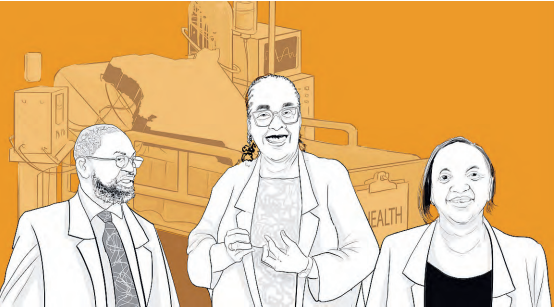
Kenya is celebrating a new era of global health leadership, with three of its own stepping into significant international roles.
Dr Jacqueline Kitulu has been elected as chairperson of the World Medical Association, Dr Ahmed Ogwell serves as vice president of Global Health Strategy at the United Nations Foundation and Dr Anne Kihara holds the presidency of the International Federation of Gynaecology and Obstetrics.
The appointments place them at the forefront of critical global health issues, from setting ethical standards and advocating maternal health to shaping pandemic preparedness strategies.
While their achievements are a source of national pride, an essential question emerges:
Can their global influence translate into concrete improvements in Kenya’s healthcare system, or will it remain disconnected from the realities faced by patients and healthcare workers?
Dr Kitulu’s new role offers her a platform to shape international standards in medical ethics, physician welfare and digital health.
As she leads discussions that could influence how doctors practise and how patients receive care worldwide, she has the opportunity to advocate the well-being of healthcare workers and the ethical use of technology in medicine.
But in Kenya, many doctors face different challenges.
A recent study found that nearly half of the country’s medical residents are at high risk of burnout, with female doctors particularly affected.
The long working hours, limited resources and inadequate support contribute to a healthcare environment where global guidelines can feel far removed from daily struggles.
Can Dr Kitulu’s leadership at the WMA inspire policy changes in Kenya that improve working conditions and support mental health for doctors on the front lines?
Similarly, Dr Ogwell’s experience and strategic role at the UN Foundation place him at the heart of global health policy, particularly in the context of pandemic preparedness.
His leadership at the Africa CDC during Covid-19 demonstrated his ability to coordinate responses that saved lives across the continent.
Yet, Kenya’s own pandemic response highlighted systemic weaknesses.
Despite early access to vaccines, the country struggled with distribution, lagging behind regional peers like Rwanda.
This disparity points to a crucial challenge:
How can Kenya integrate Dr Ogwell’s insights and regional expertise to build a more resilient health system that is prepared for future crises?
Dr Kihara, as the first sub-Saharan African to lead FIGO, brings attention to maternal and reproductive health—a critical issue in Kenya, where maternal mortality remains high, especially in rural areas.
Her presidency allows her to advocate improvements that align closely with Kenya’s needs, where the maternal mortality ratio remains more than 300 deaths per 100,000 live births, far above the global target of fewer than 70.
Her role could attract international support for programmes targeting maternal health, but turning this visibility into tangible outcomes requires coordination with Kenya’s health institutions.
Neighbouring countries like Tanzania have seen success with community-based maternal health interventions, suggesting that adapting global best practices to local conditions can make a significant difference.
The question is whether Kenya can align its maternal health policies with Dr Kihara’s advocacy efforts to ensure safer births and improved care for mothers across the country.
While their global roles offer immense potential, the impact of these leaders ultimately depends on whether Kenya can bridge the gap between their international influence and local health priorities.
Dr Kitulu’s position could support the development of telemedicine infrastructure, but this would require investments from Kenya’s Ministry of Health to extend digital health solutions to rural areas.
Similarly, Dr Ogwell’s strategic insights could guide reforms in Kenya’s public health system, but translating his global experience into effective national policies requires a commitment to building logistical capacity and investing in public health training.
Kenya’s structural challenges in healthcare, such as bureaucratic delays and unequal access to services, remain significant hurdles.
Addressing these issues is
crucial if the influence of the three is to result in real
change.









